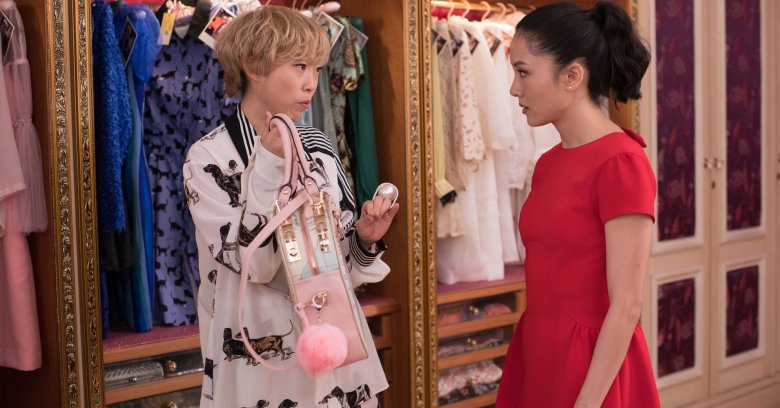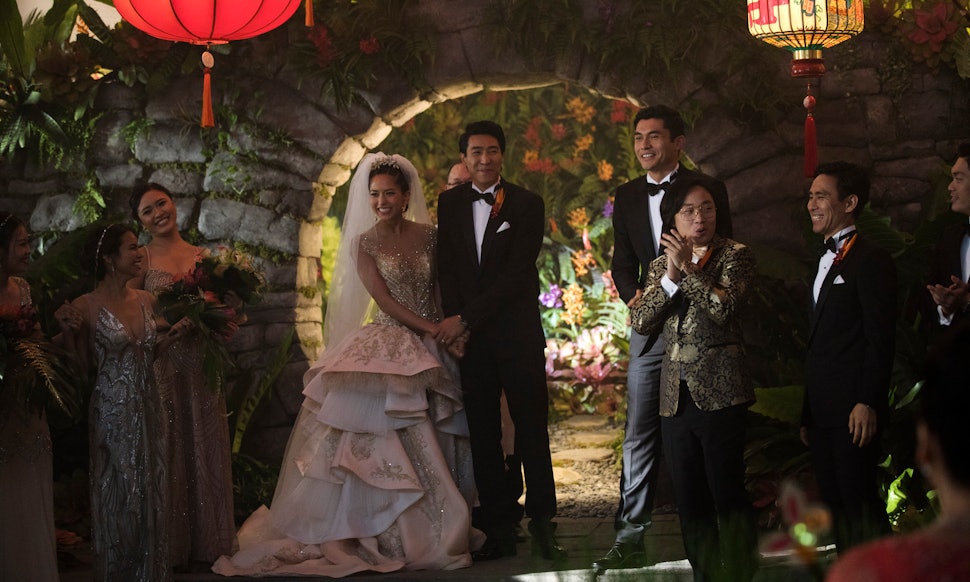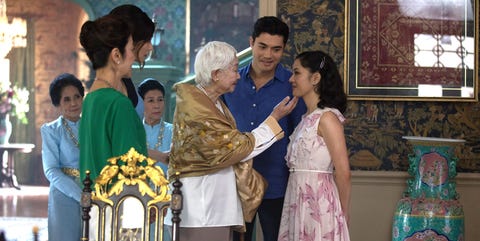Starring:
Constance Wu, Henry Golding
Gemma Chan, Lisa Lu, Awkwafina
Harry Shum Jr, Sonoya Mizuno, Chris Pang, Jimmy O. Yang
Ronny Chieng, Remy Hii, Nico Santos, Jing Lusi, Pierre Png, Fiona Xie
Ken Jeong, Michelle Yeoh
Contents:
Opening
The Rebirth of the Romantic Comedy
Wealth
New Money vs. Old Money
Family & Heritage
Beauty & Pitfalls
In Conclusion
Rating
Contents:
Opening
The Rebirth of the Romantic Comedy
Wealth
New Money vs. Old Money
Family & Heritage
Beauty & Pitfalls
In Conclusion
Rating

It has become evident that 2018 is a watershed year for diversity in film. February's Black Panther shattered records and made $700 million in the United States alone, making it the third highest-grossing film in American history. It was Hollywood's first attempt at an almost all-black cast headlining a major blockbuster. Historically, those types of films play to a small yet vocal niche African-American audience. But Black Panther became a cultural phenomenon, and it became clear that it did not simply slip through the cracks. The film proved that no matter the ethnicity of the leads, all demographics will show up to a great movie.
How does this connect to Crazy Rich Asians? A romantic comedy-drama based off of a best-selling novel by Kevin Kwan, Crazy Rich Asians centers around Rachel Chu and her romantic relationship with Nick Young. Rachel is a Chinese-American economics professor who travels to Nick's home in Singapore for his best friend's wedding, gradually becoming aware that his family is one of the wealthiest in the world. As a result of the wealth and cultural disparities, she finds her heritage clashing with his family's. Like Black Panther, this is a predominantly (entirely) Asian cast and is set in Asia with a plot surrounding and celebrating Asian heritage. It opened to around $25 million for the weekend, a far cry from Black Panther's $200 million. But the following weekends, it dropped by margins by single digits. These are holds that liken it to the kind of success Black Panther, Wonder Woman, and similar phenomena experienced, even if its start was smaller. Never again can anyone claim that Asians cannot headline a film. When it closes, Crazy Rich Asians will be within reach of the latest Star Wars film, which is a feat no one saw coming. Recall what I said earlier about Black Panther. "...all demographics will show up to a great movie." So that would indicate that Crazy Rich Asians is inarguably a great movie, right? Yes, not only is Crazy Rich Asians "crazy important" to filmmaking and culture, it is an incredible depiction of class, wealth, identity, and heritage set against a stunning backdrop. Such a monumental achievement could not be paired with a better film.
How does this connect to Crazy Rich Asians? A romantic comedy-drama based off of a best-selling novel by Kevin Kwan, Crazy Rich Asians centers around Rachel Chu and her romantic relationship with Nick Young. Rachel is a Chinese-American economics professor who travels to Nick's home in Singapore for his best friend's wedding, gradually becoming aware that his family is one of the wealthiest in the world. As a result of the wealth and cultural disparities, she finds her heritage clashing with his family's. Like Black Panther, this is a predominantly (entirely) Asian cast and is set in Asia with a plot surrounding and celebrating Asian heritage. It opened to around $25 million for the weekend, a far cry from Black Panther's $200 million. But the following weekends, it dropped by margins by single digits. These are holds that liken it to the kind of success Black Panther, Wonder Woman, and similar phenomena experienced, even if its start was smaller. Never again can anyone claim that Asians cannot headline a film. When it closes, Crazy Rich Asians will be within reach of the latest Star Wars film, which is a feat no one saw coming. Recall what I said earlier about Black Panther. "...all demographics will show up to a great movie." So that would indicate that Crazy Rich Asians is inarguably a great movie, right? Yes, not only is Crazy Rich Asians "crazy important" to filmmaking and culture, it is an incredible depiction of class, wealth, identity, and heritage set against a stunning backdrop. Such a monumental achievement could not be paired with a better film.
The Rebirth of the Romantic Comedy

If you read my ranking of the best films of 2018 so far, you may have noticed my praise for Netflix's Set it Up. That film breathed a fresh new life into the romantic comedy. It abandoned all stereotypes and told an organic story that happened to be a rom com. To many, Netflix has become the home of the rom com and a theatrical film hasn't really made an impact since 2009's The Proposal starring Sandra Bullock and Ryan Reynolds. Those are two humongous movie stars who were at the height of the powers in 2009. Crazy Rich Asians stars relative unknowns Constance Wu and Henry Golding. When Set it Up hit Netflix, critics (and myself) were stunned, and sung its praises. None of us expected that Crazy Rich Asians would further revitalize the rom com. I referred to Crazy Rich Asians above as a romantic comedy-drama, rather than a straight-up rom com. I think this is an important clarification. The Proposal lacks any real serious themes (I invite arguments). And while Set it Up is a fantastic film, it also is lighthearted and not set in a serious world. Crazy Rich Asians has its funny moments and at times can be laugh-out-loud hilarious. But at its heart, it is a real depiction of relationships both romantic and familial, and demands that you take it seriously. Nonetheless, the romance aspects of this film and its shocking triumph will be studied, and I would not be surprised if we see many serious romance films next year trying to capitalize on this success.
Wealth

It would be very easy for Crazy Rich Asians to fall into a crass display of wealth. After all, these people are "crazy rich" and essentially in the top 0.00001%. This is the kind of wealth that no one can relate to, and that is an obstacle the film has to overcome. The Young family has a balancing act to accomplish — their wealth could be portrayed in such a ridiculous fashion that it's played for laughs, or it could be so glamorous that it sparks intrigue in the sense that tabloids do. Both of these are at play here, but a third option is also present. The wealthy characters are so relatable that their net worth does not define them. The Young family, at their core, is not defined by their money even if their outward appearance suggests it. Little time is spent on how they achieved such success and how they spend it. One of the early laughs is the description of a priceless ancient gong. Rachel asks "Why would they want to buy a rare Cambodian gong?" to which a family member remarks: "Because they can." This could easily become the running gag but the film's script balances it very carefully, never fully diving into their lifestyles, yet refraining from keeping them at an alluring distance. But the most fascinating aspect of the Young's wealth is the timeless new money vs. old money debate, which I will expand on.
New Money vs. Old Money

Our first introduction to who the Young family really is occurs at a dinner party with Rachel's Singaporean college friend Goh Peik Lin (played hilariously by Awkwafina) and her family. Their family is also crazy rich, but it's new money. The Youngs are old money; seeds that have been sowed over generations and generations. This debate is probably best exemplified in F. Scott Fitzgerald's The Great Gatsby, with Tom and Daisy representing old money and Gatsby representing the new. Unlike that story, the two never come to a head. There is no confrontation between families, because they simply do not exist on the same plane. Rather, the viewer sees the Youngs and their lifestyle and is able to personally distinguish what makes the two families different. I thought this was an incredibly mature and realistic depiction, and it made the point crystal clear without unneeded drama.
Family & Heritage
If there were an antagonist, it would be Nick's domineering and terrifying mother Eleanor. But like many other features of the script, things are not so black and white. Eleanor explains to Rachel that she was studying to be a lawyer and gave it all up to raise her family. This idea of a traditional Asian family is compared to the contemporary American one. In Asia, a parent molds their children to be exactly what they want them to become. In America, parents encourage children to find their own happiness. Eleanor remarks that this must be too "old-fashioned" for Rachel to understand, yet she dismisses the notion. Much is at play in these combative scenes between the two women, and it is clear that this is the central conflict. Rachel is not an Asian woman in Eleanor's eyes. As Rachel's own mother says in an early scene, "Your face is Chinese, you speak Chinese, but in here (pointing to her head), not Chinese". The comparison of an "unrefined banana" (yellow on the outside, white on the inside) is played for laughs but could not be more accurate to this traditional Asian perception of an Asian-American. Nick's entire family struggles to come to terms with Rachel's background and lack of a wealthy background, even if he himself does not care. Since Eleanor is the film's makeshift villain, this idea could come off as "old-fashioned" in the sense that it requires a swift change. Yet this is not black and white. It is just a different viewpoint, and an exception could be made even if it takes time. These characters are human and fallible. Mistakes are made in their pursuits for what they think is best. In the film's conclusion, Rachel and Eleanor give each other a look, and I did not get the idea that Eleanor suddenly approved of Rachel with this acknowledgement. This is a realistic film and that kind of approval would be impossible to achieve overnight, and would be out of character for Eleanor.
Beauty and Pitfalls

The wedding scene is one of the most beautiful in any movie I have seen. The sheer glamour in the arrangement of sets and costumes paired with stunning music, cinematography, and a climax in the characters' stories make it a whirlwind of cinematic perfection. And remember, the viewer is not invested in the story of the bride and groom, yet somehow their romantic celebration feels powerful through such excellent execution. Many times throughout the film, clever shots and music set this film above other romances. Asian versions of Madonna's "Material Girl" and Coldplay's "Yellow" and a memorable depiction of text-gossip in the opening elevate this to something special. When Rachel and Nick first arrive in Singapore, we are treated to a romantic montage; a staple of the genre. Yet the backdrop is a rural Singaporean marketplace and local food, and it is an early insight into this culture. Crazy Rich Asians is trying to break cliché while sticking to a standard script.
I said that the wedding is an important climax for many characters in the film, and this is where the film's only glaring flaw lies. There is a B storyline featuring Nick's cousin Astrid and her cheating husband, and it is the only place where the dialogue and story fell into eye-rolling territory. Astrid represents a complex emotional center, but her outward appearance is nothing short of the richest and most expensive tastes. As a performance, Gemma Chan did a fine job, but the character was just the un-relatable billionaire stereotype the main storyline avoids. Her emotional speech seemed like something out of a Lifetime movie and a baffling credits scene likewise showed that she was the weak link of Crazy Rich Asians. There was a tenderness explored in Astrid and her scenes with Rachel, and she symbolized a dangerous descent into material possessions. The lack of exploration in this theme and the lack of interest in her failing marriage, despite how important it seemed, turned me off to the character.
I said that the wedding is an important climax for many characters in the film, and this is where the film's only glaring flaw lies. There is a B storyline featuring Nick's cousin Astrid and her cheating husband, and it is the only place where the dialogue and story fell into eye-rolling territory. Astrid represents a complex emotional center, but her outward appearance is nothing short of the richest and most expensive tastes. As a performance, Gemma Chan did a fine job, but the character was just the un-relatable billionaire stereotype the main storyline avoids. Her emotional speech seemed like something out of a Lifetime movie and a baffling credits scene likewise showed that she was the weak link of Crazy Rich Asians. There was a tenderness explored in Astrid and her scenes with Rachel, and she symbolized a dangerous descent into material possessions. The lack of exploration in this theme and the lack of interest in her failing marriage, despite how important it seemed, turned me off to the character.
In Conclusion

The last time an American film had a predominantly Asian cast was in a modern setting was in 1993's The Joy Luck Club. We have discussed the sad realities of African-American representation in film for years, yet Asians have similarly had a hard time making it to the big screen. Crazy Rich Asians' success has hopefully proven once and for all that Asian talent can sell tickets, and like I said earlier, make Star Wars money.
I hope that my constant talk of its important financial success does not give the impression that I am praising this type of success alone. Much like the theme of the film, it's easy to get caught up in dollar signs and fancy titles. Crazy Rich Asians' quality is not due to its box-office success. Rather, it has become so successful and shattered the glass ceiling for Asian talent because it is of such immense quality.
You cannot miss this film. See it in support of a community that has struggled to find representation. See it because it's an important conversation we need to have. See it because it celebrates culture different than our own. But see it because it's simply a fantastic movie, and deserves your attention.
Rating:
9.5/10 Stars